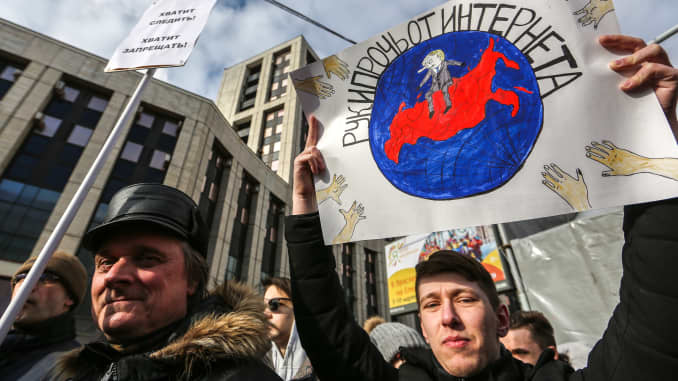
It’s been called an online Iron Curtain.
On Friday, a controversial law went into force that enables Russia to try to disconnect its internet from the rest of the world, worrying critics who fear the measure will promote online censorship.
The Kremlin says its “sovereign internet” law, which was signed by President Vladimir Putin in May, is a security measure to protect Russia in the event of an emergency or foreign threat like a cyberattack. The law will allow Moscow to tighten control over the country’s internet by routing web traffic through state-controlled infrastructure and creating a national system of domain names.
In theory, the measure would allow Russia to operate its own internal networks that could run independently from the rest of the World Wide Web.
Experts doubt whether such a move is technically possible and say the law is, instead, an attempt by the Russian government to censor information online.
“To be able to manage the information flow in their favor, they have to have a system in place beforehand,” said Sergey Sanovich of Princeton University’s Center for Information Technology Policy in a CNBC interview.
Thousands of protesters took to the streets in Russia to protest the measure earlier this year, while human rights advocates warned the law threatens free speech and media.
“The ‘sovereign internet’ law purports to provide a legal basis for mass surveillance and allows the government to effectively enforce online existing legislation that undermines freedom of expression and privacy,” Human Rights Watch said in a blog post Thursday.
Putin has taken a series of other steps to try to curb online freedoms, such as banning encrypted messaging service Telegram, but many of those attempts have proven to be unsuccessful.
“The goal is to be able to block what they don’t want without harming the network overall,” Sanovich said.
Russia not like China
Unlike China’s Great Firewall, which was built on a tight concentration of state-run network operators, Russia allowed its internet to develop freely over the past three decades. Undoing global network connections is tricky, according to Andrew Sullivan, president and CEO of the Internet Society.
“You can think of the network connectivity like water that is trying to get to the lower ground; it’s going to keep trying to flow,” he told CNBC. “You have to do a whole lot of work to make sure that the traffic won’t flow.”
Sullivan said Russia has tried to carry out tests to block its internet in the past but the networks proved to be resilient. The new law, he said, will end up making the internet less reliable for users in Russia.
“By using this regulatory model for the internet when the internet isn’t really designed to work that way, we risk doing damage,” he said.
[“source=cnbc”]
